








• • Loopholes in the current water regulation makes in the current water makes monitoring and law enforcement a challenge monitoring and law enforcement a challenge
• • Proposed review of water related acts hoped to review of water related acts to close regulation gaps close gaps
• • Once they come into effect, monitoring and law Once come into e ect, and law enforcement will be effective e
• • Review of the law also touches on amendment of Review the law also touches on amendment fines nes
• • Collaboration on water management encouraged Collaboration on water


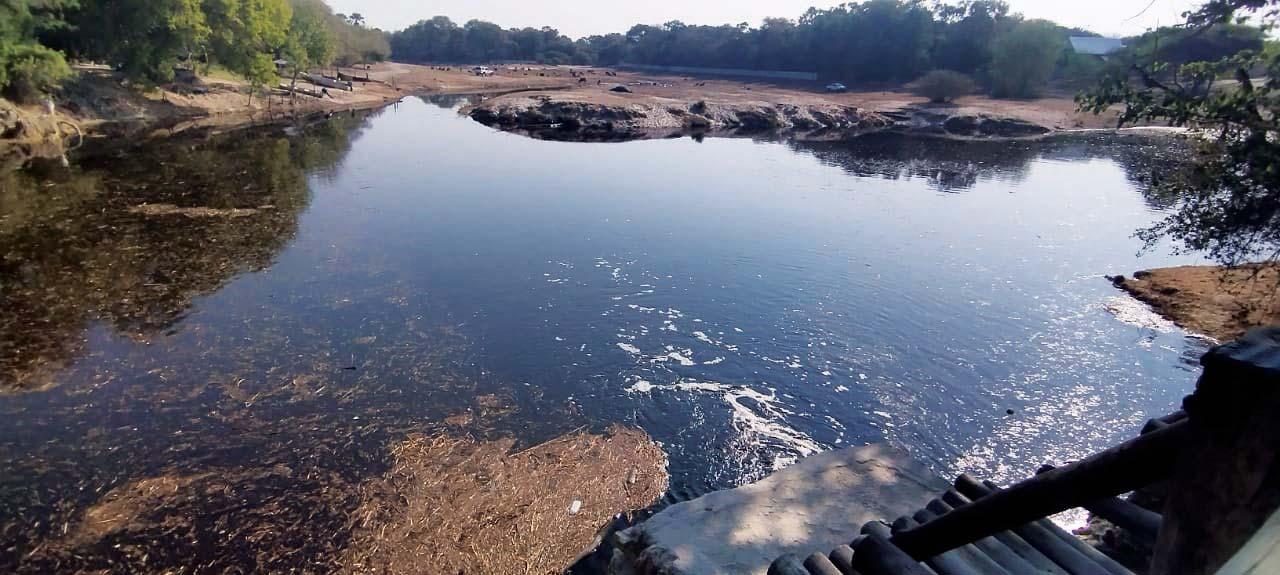
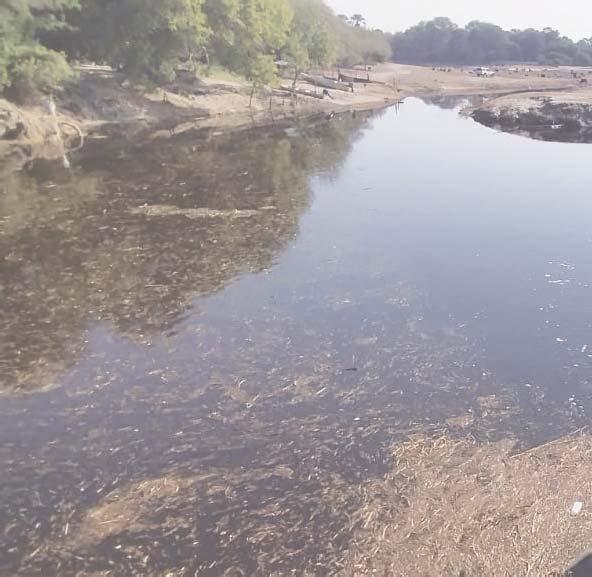

By Joseph Kgamanyane
The current sad of affairs on the environmental transgressions in the Thamalakane River, and others in the system has been blamed on poor law enforcement with relevant authorities and a lack of collaboration by other stakeholders.
This as the current water regulation has some loopholes that make monitoring and law enforcement a challenge, it has emerged.
Currently, as the Thamalakane River system is receiving its annual flood waters from the Okavango River system, there is a public outcry about the Thamalakane River being subjected to among other things, over abstraction of surface water by some construction companies, pollution, illegal damming and sand mining and lately illegal well points that extract water near the river. Responding to the outcry this week, the North West District Commissioner, Thabang Waloka suspended abstraction of water from the Thamalakane and its associated rivers until further notice.
This as it may, the Depart-
ment of Water and Sanitation (DWS) is currently developing a proposal to the review five water related acts, hoped to close regulation gaps. And until then, law enforcement currently remains the major issue.
Nancy Kgengwenyane, a DWS consultant for the proposed review of the five water related acts, has assured that when the new proposed laws come into effect, monitoring and enforcement will be effective.
“We have come from far with the issue of enforcement in the sense that capacity is not there. Right now under the water laws that exist there is no provision” she said during their consultation meeting with the Maun leadership this week.
The consultant also added, “there is no enforcement regarding riverbed activities in all our rivers, there is no care as to what happens, enforcement from departments is not there. So when we were reviewing the laws we saw that the water offences are not there, it’s only now that we have included them.”
Kgengwenyane regretted that taking enforcements powers from local authorities under
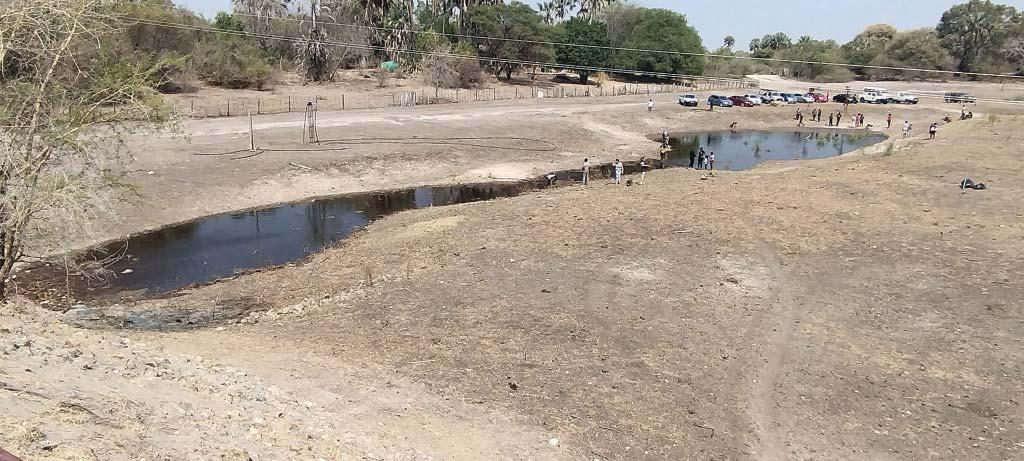
the local government act created a vacuum. “When you see someone doing something wrong you ask yourself which law can I use as a local authority? so there is a gap.”
She added that while some of the activities can be reported to the police as a nuisance, that is however not deterrent enough because the fines in her own words are a ‘joke.’ She stressed that the review of the law also touch on the fines.
Meanwhile the consultant is of the view that issues of water management should not be the responsibility of
government alone but also of other stakeholders. “That is why in this proposal we are saying that Batswana through fishing associations, farmers’ associations and catchment management committees should be given powers to monitor, report and advise or even be able to get an interdict from the magistrate guided by water laws and regulations,” she added
Kgengwenyane stressed that people must be included in the management of water resources at the lowest level possible.
To address the issue of disposing waste into the river, the consultant advised that the waste management act can be used at the moment while awaiting the reviewed acts.
As for domestic use of water, she said it is important for inspections to be conducted to ascertain their level of abstraction to avoid any form of dubiousness. “It has been defined in the law that when we say domestic use at household level what do we mean, what are the limits of abstracting water,” she emphasised.
As for illegal damming, Kgengwenyane assured that the ground water management and abstraction regulations will require for dams to be registered no matter the size.
“This planning is the one that is going to prevent people from just coming into the river and dam without permission. That’s just going to die away. If you have been damming, when the law comes into effect, you may be required to move away looking at the modest plan,” she warned.
By Bhekinkosi Phiri
In an effort to safeguard Botswana’s rich traditional knowledge and enhance the economic prospects of indigenous communities, the Companies and Intellectual Property Authority (CIPA) has launched the Intellectual Property and Traditional Medicine Project which is
set to revolutionise the way traditional medicine practitioners (TMPs) engage with intellectual property rights.
“The project is a collaborative effort supported by the World Intellectual Property Organization (WIPO), and it focuses on capacitating 25 traditional medicine practitioners across Botswana,”
Marietta Magashula, the
Awareness and Communication Manager of CIPA explained.
“Our goal is to empower these practitioners with the necessary tools to understand and utilize intellectual property (IP) effectively. This includes training in branding, marketing, and commercialization strategies, all aimed at promoting traditional medicine and ensuring its integration into mainstream pharmacies and retailers.”
Magashula emphasised that the overarching objective is to elevate the lives of TMPs and their communities by making traditional medicine more accessible to the general public.
“By registering trademarks, particularly collective trademarks, and other collective rights, we can add significant value to these products and services,” she added. The project’s success hinges on a network of partnerships, including the Ministry of Trade and Industry, the Ministry of Health, various TMP associations, and academic institutions like the University of Botswana.
“These stakeholders play vital roles in mobilising practitioners, facilitating laboratory tests, and providing guidance and funding to help commercialize traditional
medicine products,” Magashula noted.
CIPA’s efforts are supported by the Industrial Property Act (CAP 68:03) and the Botswana Intellectual Property Policy of 2022.
“Our policy emphasises leveraging traditional knowledge to create real economic opportunities for Batswana,” she explained. “We aim to integrate traditional medicine into Botswana’s pharmaceutical industry, promoting research and development that can lead to the production of new medicines.”
Documenting and registering traditional knowledge, particularly traditional medicine, is a critical component of the project. Magashula elaborated on the registration process: “Currently, traditional knowledge holders can complete an application form at our CIPA offices, with plans to move the process online later this year. Applicants provide a brief description of their knowledge, and we allow them to keep some information private to protect their intellectual property.”
To ensure active engagement and consent from traditional knowledge holders, CIPA conducts awareness campaigns through various platforms. “We hold kgotla meetings, engage one-on-one
with rights holders, and work closely with village leadership across the country,” she said. “Our focus is on educating these practitioners about the importance of IP protection to prevent unauthorized exploitation of their knowledge.”
Despite the project’s promising outlook, Magashula acknowledged the challenges faced by CIPA. “One of the main obstacles is the lack of intellectual property awareness among potential rights holders. Many practitioners prefer to keep their processes secret, which complicates the registration process,” she said. “However, we offer the option for them to withhold certain information while still protecting their knowledge through IP registration.”
Commercialisation also presents its own set of challenges. “Many traditional medicine products are not properly labeled or packaged, and they lack trademarks or brands, making it difficult to advertise and sell them,” Magashula explained. “Our project addresses these issues by providing training and support for TMPs to develop their products for the market.”
Looking ahead, CIPA plans to expand the project beyond the initial group of 25 prac-
titioners. “Our vision is to extend this initiative to other traditional knowledge holders across Botswana, maximizing the economic benefits of our cultural heritage,” Magashula shared.
While the project is still in its early stages, having only launched in July 2024, Magashula is optimistic about its long-term impact.
“We expect the project to lead to the production of well-researched and tested traditional medicine products, complete with registered trademarks and appropriate packaging,” she said.
“This will open up new market opportunities in retailers and pharmacies, ultimately creating sustainable businesses, alleviating poverty, and generating jobs.”
CIPA envisions a future where protected traditional medicine practices are fully integrated into Botswana’s public health system, contributing to the development of a robust pharmaceutical industry.
“Our work is just beginning, but we are committed to making a meaningful impact on the lives of traditional medicine practitioners and their communities,” Magashula concluded.
By Joseph Kgamanyane
Water Utilities Corporation
(WUC) may in future well be regulated, should government approve the proposed review of water regulation that the department of Water and Sanitation (DWS) is currently developing.
The process to review is currently at consultation stage and covers the boreholes, aquatic weeds control, water utilities corporation and the waterworks acts.
In an interview on the sidelines of their consultation meeting with the Maun leadership this week, DWS’ chief water engineer, David Molefha revealed that as they review, they hope to streamline and consolidate some and eventually come up with three acts - being the water framework act, water utilities corporation act and the water and sanitation regulatory authority act.
The Water Utilities Corporation act according to Molefha, will do away with the clause that allows WUC to self-reg-
ulate, and create an authority that will take all the regulatory powers for all the water sectors.
The water and sanitation regulatory authority act on the other hand, will result in the establishment of an organisation that will regulate water and sanitation services in Botswana.
“In the current acts there are gaps and bottlenecks, there is where they overlap, so we are trying to remove those,” he stated.
He indicated that the main aim of reviewing these acts is to facilitate improved livelihoods for locals and that of doing business in the country, this as businesses are driven by water. On issues of sanitation, the intention is to protect the environment and ensure that the entire sanitation generated in the country is treated to certain standards and discharged into the environment at permissible ones.
“The other issue is to ensure that those who are based where there is no sewerage network are also regulated ac-
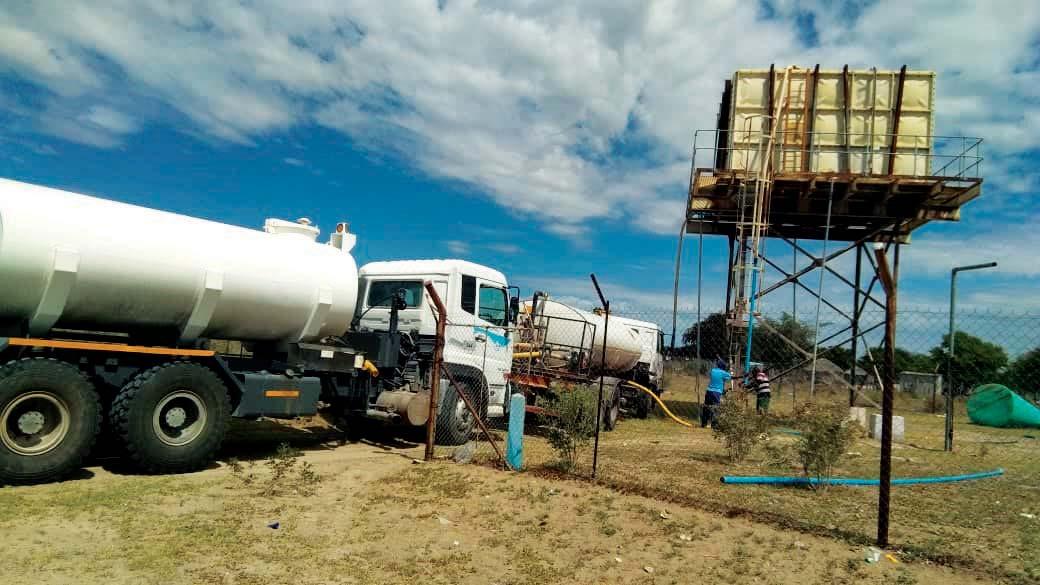
cordingly, to ensure that they do not contaminate underground water. This is because almost 60% of water supplied in Botswana comes from the ground water so if we pollute it we reduce our source water that we depend on.”
The changes according to
Molefha will also see those providing drilling services being regulated to ensure that they are registered accordingly. This he said follows numerous cases they are working on with the Consumer and Competition Authority (CCA) where consumers cry
foul over the poor service they receive from some of these providers.
“So the reviews will ensure that both customer and the companies are protected and will bring fairness. The service provided should be of high standard in terms of
quality and and durability because Batswana drills these boreholes with the intention to tap into government programs such as Thuo-Letlotlo and Temo Letlotlo so they should not be disadvantaged by poor service” he emphasized.
By Joseph Kgamanyane
Tawana Land Board chairperson, Reamogetse Yakenge has allayed fears that the board will in its reviewed land policy that is yet to be finalised enforce powers to repossess some of the undeveloped plots across its jurisdiction. While the board remains concerned about those plots especially those for ploughing fields the authorities however seem to be shying away from taking that step only threatening that the law allows for them to repossess.
The cancellation of the grant of any right to use any land is in line with tribal land act, 2018 which has vested land boards with powers to repossess plots that have remained undeveloped for years and allocate them to those on the waiting list.
However, the Ministry of Land Management, Water and Sanitation Services (MLWS) has always not strictly enforced repossession of undeveloped land, rather preferring to engage with the affected plot owners to understand what could be inhibiting the development of the plot. Land authorities would then enter into agreement with those that remain with undeveloped plots to indicate when they would
develop them.
Kgosi Merafhe Mothala of Khwai village this week expressed concerned as to why would the board in its draft policy show that it has the responsibility to grant rights to use land while at the same time it can cancel grant right to use any land. He sought clarity of that conflict so as to alert his people back home that their plots may be on the line to be repossessed.
Responding to the chief during their consultative meeting in Maun this week, the board’s chairperson clarified, “we don’t mean that we will go around cancelling people’s plots, our main task is to allocate people plots but if there is something that forces us to cancel that plot we will do that.”
Yakenge added, “the board does not just cancel plot ownership, there is a process involved which include consultation and reaching agreements between the two parties, assessments of the plot to be repossessed as well as payment of losses.”
Acting board secretary, Kesego Kgarathi however had to buttress that the way ploughing fields remain uncultivated and undeveloped for some years in Ngamiland, the law allows for them to be repos-
sessed.
Besides remaining undeveloped for a long time, Kgarathi added that the board also has powers to repossess even those that are now used not for their initial requested purpose, or whereby owners extend the plots or exchange it with someone else without seeking consent of the board.
The rationale behind the review of Tawana Land Board land allocation policy is to provide guidance for land allocation and land management and also to align it with, the re-enacted Tribal Land Act of 2018 and the Botswana Land Policy as reviewed in 2019.
The policy is designed to provide direction and to serve as a standard tool to be used specifically for land allocation and management in the Tawana Tribal territory. It is meant to address the discrepancies observed regarding land allocation and management.
The policy is to be read and applied in conjunction with the Tribal Land Act of 2018 and other legislative provisions which form a complementary documentation to this policy. However, the Tribal Land Act of 2018 takes precedence wherever there is conflict of interpretation.
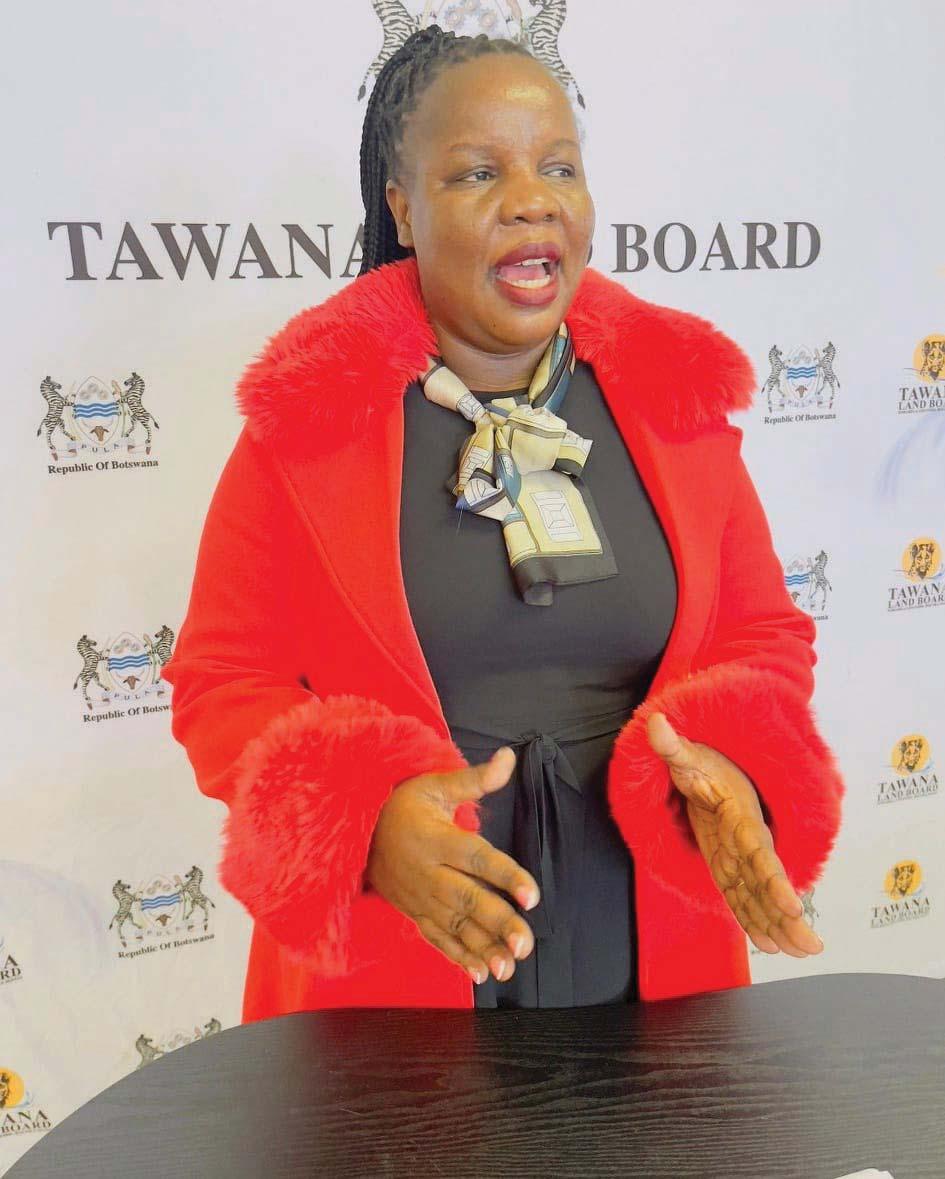
‘‘The Last newspaper established in the 20th Century’’ CONTACTS:
Email: info@ngamitimes.co.bw
Website: www.ngamitimes.co.bw
Telephone: (+267) 686 4807, (Adverts) 686 4819
Cell phone: (+267) 74 588 802 / 71 676 974 (App)
SALES AND MARKETING
Kgothatso Dave Sampora Tel:(+267) 686 4807
E-mail: kgothatso.sampora@ngamitimes.co.bw
ACCOUNTS
Banyefudi Sampora Tel:(+267) 686 4819
E-mail: banyefudi.sampora@ngamitimes.co.bw
EDITOR
Bright Kholi
E-mail: bright.kholi@ngamitimes.co.bw Contact: (+267) 73632144
GRAPHIC DESIGNER
Leatweng Gababonwe
E-mail: leatweng.gababonwe@ngamitimes.co.bw Contact: (+267) 74394814
PRINTING
Baroma Phetogo Contact: (+267) 77956066
Printed and published by The Ngami Times Printing and Publishing Co (Botswana) (Pty) Ltd at their offices, Mabudutsa Ward, Maun. Tel; 6864807, Fax 6860257 E-mail: tnt@info.bw. Website: www. ngamitimes. com Printed on recycled newsprint. Member of Media Institute of Southern Africa and Press Council of Botswana.Registered at the Post Office as a newspaper. Company registered in Botswana. All material and photographs appearing previously, currently and in future are protected items of the Copyright Act. Only the editor can provide permission for reusage of such material on receipt of a written request.The public is informed of the existence of the Press Council of Botswana, which endeavours to enhance media accountability and professionalism. For this purpose, the public is urged to refer any complaints, suggestions or comments regarding issues of how the media in Botswana reports generally to the following address: The Chairperson, Press Council of Botswana, PO Box 301315, Tlokweng. Tel 3500378. Fax 3161196.
The Ngami Times does not accept liability for errors in advertisements that do not detract from the original. This includes spot or full colour. While every effort is made to meet advertising and printing requests, it can sometimes happen that such errors do occur. Such advertisements may appear to be slightly different from those requested but not necessarily differ from the original. In the event of advertisements supplied in a computer format to which The Ngami Times does not have access, reconstruction of such advertisement will be done to as near as is possible to the original typefaces. Advertisements are published at the advertiser’s own risk. Changes to advertisements will be accepted until Wednesday 1pm prior to publication date. Any changes received after this time will not be accepted and cancellation of such advertisement will not be accepted without an agreement by the advertiser to pay 50% of the quotation given at the time of booking such advertisement. Only one proof of Display advertisements will be provided (this does not apply to Classified advertisements, for which no proof will be supplied) and said proof must be signed and returned to the newspaper as soon as possible prior to publication date. The breaking of contract obligations will be charged at 50% of the total signed contract period The Ngami Times does not accept advertisements containing offensive language and any such advertisements will be rejected without explanation.
All opinions expressed by letterwriters published in these columns is their opinion only and not necessarily those of The Ngami Times. Readers are reminded that any letters received commenting on High Court or magistrate’s court proceedings so far unresolved will not be published. Comment on such cases is sub judice until the hearings are complete. Letters must be
By Bhekinkosi Phiri
The Water Utilities Corporation (WUC) Maun, has reported a significant progress in combating the theft of brass water meters by approximately 75%, and a 52.5% reduction in pipeline damages in Maun.
WUC Maun General Manager Paul Mafavuneh, said these developments have brought considerable savings for customers and highlighted the effectiveness of a collaborative approach with local stakeholders that include the Maun Police.
“We have been working around the clock with other stakeholders to rectify issues we have faced with vandalism of pipelines and theft of brass meters. Placing the protection of state property as a priority has been essential to thwart these issues,” Mafavuneh stated.
Recent statistics underscore the success of these efforts.
During the months of June and July, Maun recorded 19 stolen brass meters, a significant decrease from the 75 reported in April and May of this year alone. This reduction signifies a 74.67% drop in brass meter thefts, a remarkable improvement that has had a direct financial impact on customers.
To put this into perspective, the cost of a single brass meter theft is approximately P500 excluding water loss, which is charged to the customer. During April and May, with 75 theft incidents, customers were collectively charged around P37,500. However, with the drop to
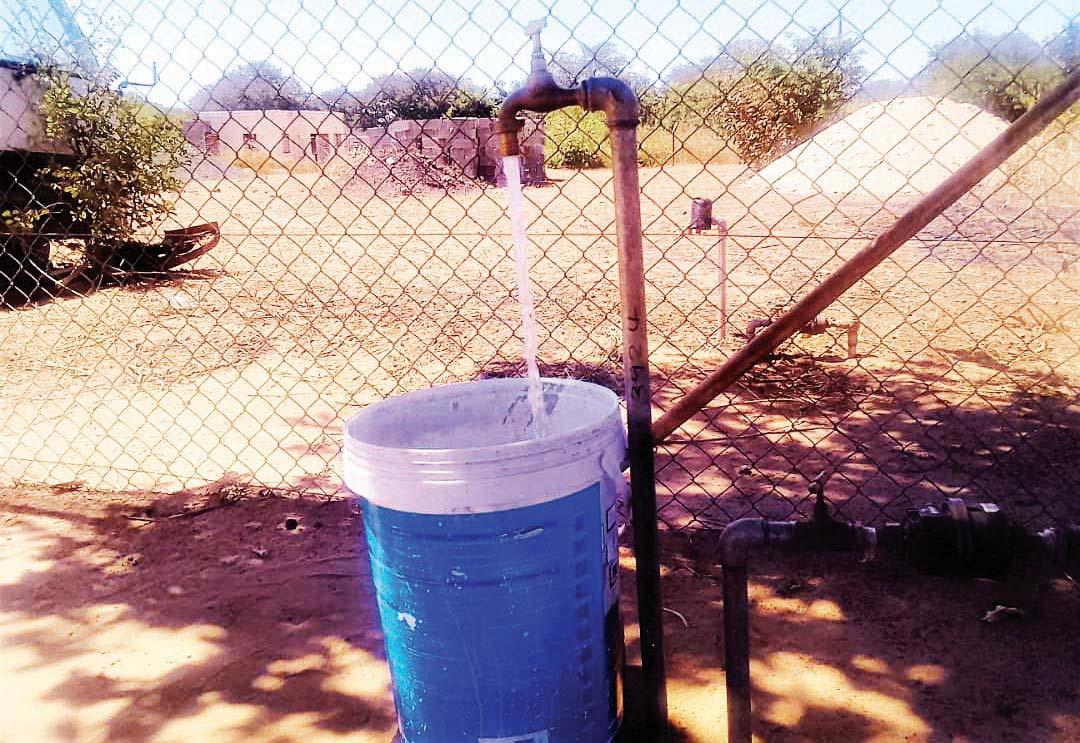
19 thefts in June and July, this cost has been reduced to P9,500, resulting in a savings of P28,000 for customers over the two-month period.
In addition to the reduction in meter thefts, pipeline damages have also seen a notable decline. Over the past two months, there have been 16 incidents of pipeline damage, a significant reduction considering the troubling statistics from the past year. Maun has experienced the highest number of pipeline vandalism cases at 240, followed by Chanoga and Makalamabedi, each reporting 96 cases from May 2023 to May 2024 for a period of 12 months.
In addition to the reduction in meter thefts, pipeline damages have also seen a notable decline. Over the past two months, there have been 19 incidents of pipeline damage in Maun, a significant reduction compared to the average
of 40 cases reported during the same period last year. In June and July 2023, pipeline incidents cost approximately P420,000 in repairs excluding water losses. However, with the decrease to 19 incidents in June and July 2024, the repair costs dropped to P199,500, resulting in a savings of P220,500.
“We have put a lot of strategies in place to combat these issues, including more strategic raids during key times, such as night and early morning, while also conducting random checks at times least expected during the day,” Mafavuneh explained. “Additionally, we have made a transition from brass meters to plastic meters, which has shown a drastic change in meter theft as these types of meters are less likely to be stolen.”
Despite these successes, Mafavuneh acknowledged that the issue of theft and vandalism persists, and contin-
ued efforts are necessary to fully eradicate the problem.
“While the partnership between Water Utilities and its stakeholders has made significant progress, we must remain vigilant. Ongoing efforts are crucial to thwart criminal activities and ensure the safety and reliability of our water infrastructure.”
Mafavuneh concluded by expressing his gratitude for the collaborative efforts that have led to these improvements. “I am thankful for the active role of our department and other departments in reducing the crime rate. I appeal to the public to continue collaborating with us by reporting any suspicious activities.”
The continued vigilance and cooperation between Water Utilities, the Maun Police, and the community will be key to sustaining these positive trends and ensuring the protection of vital water resources in the region.
By Staff Writer
An illegal immigrant from Zimbabwe, and mother of two who was nabbed in Francistown’s busy Nswazi mall for the illegal possession of an elephant tusk in June this year, has been slapped with a P20 000 fine and a four-year prison sentence. Nokuthula Sithembile Khumalo (40) who hails from Plumtree, Zimbabwe was handed down her fate this Monday by Francistown Magistrate Thapelo Buang. Khumalo was apprehended by police on the 29th of June this year, in the company of her brother in law Gilbert Dube from Maitengwe just after alighting from a mini-
bus. On being searched, police found an elephant tusk weighing 5.3 kilogrammes wrapped in a multi coloured cloths inside a 12.5 kg maize meal sack.
During her initial court appearance, Khumalo admitted to have crossed into Botswana illegally and to be the owner of the tusk.
“The young man is my brother in-law and knows nothing about the tusk. I only brought him along to help with shopping and then go back home with groceries and shoes for my children. He is innocent,” pleaded the mother of two.
During mitigation, Khumalo prayed with the court to be lenient with her, consider-
ing that she is a first offender and has young children to look after. Although she did not disclose where she was taking the tusk to, she hinted that it was headed for the black market.
“I got the elephant tusk from Zimbabwe and I was trying to help myself and my family. Back home life is tough and to put food on the table is not easy. My worship and this honorable court, I plead for mercy,” said Khumalo in mitigation.
Sentencing Khumalo, Magistrate Buang highlighted the need for stiff prison sentences in order to deter potential poachers and ivory traffickers.
“Our wildlife needs to be
protected from destruction and extinction. It also needs to be preserved for future generations, and elements such as Khumalo must be locked away, for her to learn lessons so they desist from feeding the thriving multibillion dollar black market of trafficking elephant tusks, rhino horns and other government trophies. It is my hope that during her time in prison she will learn the importance to preserve nature and being a responsible custodian of wildlife, flora and fauna,” said Magistrate Buang. For entering Botswana illegally, she was fined P1000. While charges against Gilbert Dube were withdrawn.

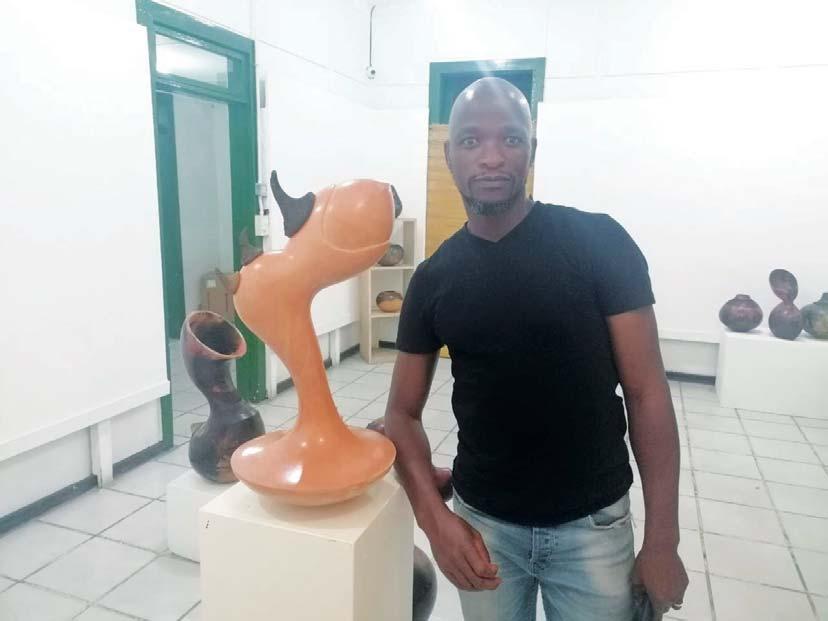
By Bhekinkosi Phiri
Veteran artist Ompatile Sebuelo, popularly known as ‘Beycah,’ has unveiled an enthralling exhibition titled “Ceramic Abstractions,” a showcase that invited audiences into a world of stilled, picturesque pieces offering an intimate glimpse into his personal journey of preservation and transformation.
“This is my comeback after a long hiatus,” Sebuelo revealed. “These pieces are a glimpse of the knowledge and tradition passed down from my grandmother, integrated with modern art styles.”
The exhibition features clay pieces polished to a glistening finish in both dark and light hues. The intricate designs included patterns and abstract shapes, ranging from feminine forms to obscure sculptures of men and women, and even abstract portrayals of flamingos.
Sebuelo shared that these
creations took months of gathering clay from his home village in Moshupa, followed by a meticulous process of removing impurities before the crafting of the piece to achieve a product he could be proud of.
“The process of gathering and refining the clay took time and patience,” Sebuelo said, “but the finished pieces were worth the effort.”
Sebuelo’s artistic curiosity began at a young age, inspired by his grandmother, a renowned clay pot maker. He sought to learn all he could about the craft to preserve the traditional art and pass it on to future generations.
Working with clay taught him valuable lessons about patience and the organic process of molding the medium without forcing control over the outcome.
Sebuelo’s background in fine arts includes a qualification from the University of Pretoria. However, it was not
Please take note our new email for all types of communication. Therefore, we request you to please update our new email in your contact list.
Email: info@ngamitimes.co.bw Website: www.ngamitimes.co.bw
until 2004 that he embarked on his professional journey as an artist. His talent soon shone through, winning him art prizes from the Thapong Visual Arts Center. Despite his success, Sebuelo stepped away from the limelight to manage other artists in Botswana, placing his own career on the back burner due to conflicts of interest between management and artistic pursuits.
“It has been a long hiatus, but I am back where I feel I belong,” Sebuelo stated. “The craft is a journey of self-discovery, and I would not choose any other path.”
Since his return to the craft, Sebuelo has expressed that this exhibition is just the beginning of what he has in store for his fans and the art community.
“This exhibition is part of what I have in store, but I have other plans to document and share my experiences,” he said. “I want to invite more people to learn about the personal journey I have gone through to craft and reflect on my career thus far. So, I encourage everyone to stay on the lookout for what I will be unveiling soon.”
Sebuelo’s return is not just a personal triumph but also a significant contribution to the art world, blending traditional techniques with contemporary artistry, and promising a future filled with creativity and inspiration.
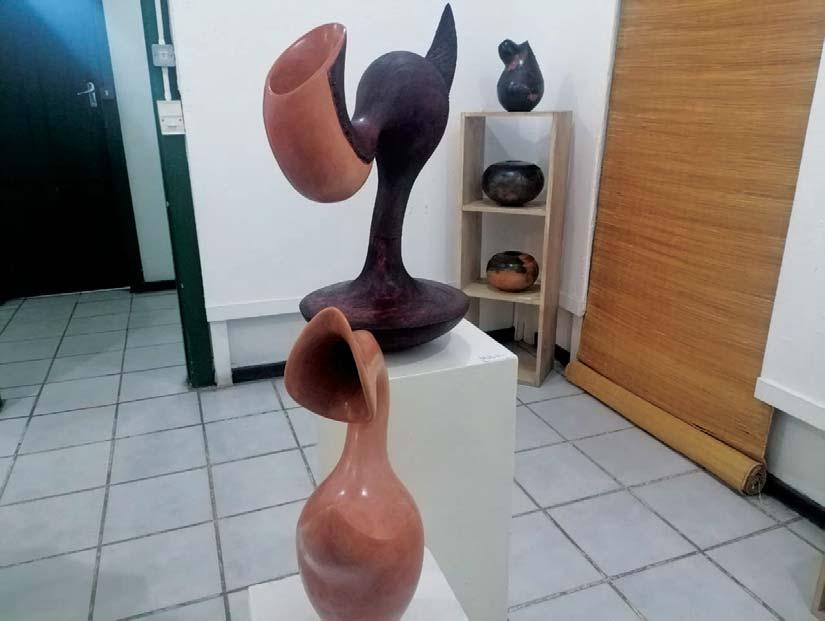

By Staff Writer
Botswana’s sole gold miner, Mupane mine has reportedly resolved terminate employment contracts for over 200 of its employees.
The decision was revealed after an intense two-day meeting with Botswana Mine Workers Union national executive committee in Francistown on Tuesday. The meeting marked the first, for the four directors of Hawks Mining the company op-
erating Mupane mine, to meet with Botswana Mine workers Union (BMWU) since operations at the mine came to a halt in March this year.
In a short interview with Ngami Times, BMWU representatives Biki Sikwane and Mbiganyi Gaekgotswe revealed that they had demanded to meet with Hawks mining directors to establish their plans regarding their employees.
“It is now six months since Mupane mine work-
ers were told to go home. They have not been paid salaries or benefits since. So we wanted to know what they are thinking regarding the welfare of these employees. This is how they agreed to convene to this meeting,” said Sikwane.
“In our negotiations, Hawks mining indicated they are financially challenged, with the wage bill being their biggest strain. Therefore, they have decided to terminate all contracts with their employ-


We are seeking an experienced Branch Manager to oversee our transport divisions, depots, and maintenance teams, ensuring seamless operations and excellence in customer satisfaction tenable in Maun and within Maun tourism. The successful candidate will be responsible for creating and enforcing detailed procedures for procurement, equipment disposal, and other critical activities. You will also efficiently manage expenses, develop budgets, handle payroll, manage staff overtime, supervise vehicle and route operations, and maintain a tidy work environment. Participation in all management meetings and 24/7 accessibility is essential.
KEY RESPONSIBILITIES:
• Leadership and Supervision: Lead and manage the Transportation Division, ensuring efficient operations, maintenance, safety/compliance, equipment management, and personnel oversight.
• Economic Performance: Oversee the division’s economic performance, with a focus on linehaul and consolidation operations.
• Procurement and Asset Management: Justify, specify, select, and procure parts, trucks, trailers, and essential equipment. Organize equipment disposal through sales or trades.
• Operational Efficiency: Minimize operational costs and maximize equipment utilization by efficient asset and resource management.
• Route and Load Planning: Develop and implement routing and load plans for all customers in linehaul and consolidation operations.
• Claims and Financial Management: Handle claims, damages, returns, depot expenses, subcontractor loads, invoices, payments, and vehicle flow at depots.
• Business Continuity: Ensure business continuity by completing all assigned, and at times unassigned, tasks.
QUALIFICATIONS AND REQUIREMENTS:
• Tertiary certificate and/or relevant diploma in Business Management and Marketing.
• Minimum of ten years of experience in a General/Operations Manager role.
• Thorough understanding of the transport and tourism industry.
• Strong negotiation skills with suppliers and service providers.
• Effective planning and organizational abilities.
• Proficiency in Word and Excel (Intermediate level).
• Ability to work both independently and collaboratively.
• Excellent communication and presentation skills.
• Strong problem-solving capabilities and dynamic thinking.
• Demonstrated leadership and mentoring skills with the ability to lead organizational change.
• Project management experience.
• High understanding of Botswana Tourism industry especially within Maun and Ngami Land
If you meet these qualifications, please submit your CV to hr@transportholdings.com by August 21, 2024
Should you not receive a response within four weeks of the closing date, please consider your application unsuccessful
ees, effective 31st July this year. This is where we are so far,” continued Sikwane.
“So they will now start to work on the termination packages for the employees, and BMWU will be an oversight body to ensure our members are happy with the packages they are receiving.” Drafts of the termination letters were expected by yesterday (Thursday).
Sikwane was however quick to say the termination of employment for workers does not mean the mine is closed. “From what the directors were saying, it seems they are regrouping themselves. They are only ending contracts with their em-
ployees. According to the directors Hawks mining company is still existing. Going forward BMWU will be watching closely whether the mine still has a future or not,” highlighted Sikwane.
“All we were told is that Hawks mining is not doing well financially. We do not have any idea who and how much they are owing. However, it seems they are regrouping and working on a way forward.”
Efforts to get a comment from Cedric Sam, one of Hawks Directors as he walked out from the Tuesday meeting did not bear fruit as he refused to divulge details of their talks with the union, or any details about Hawks mining.
A growing tourism company is looking for an Operations manager
The Role
• Day to day management of staff and assets
• Implementing and controlling costs and budgets
• Fleet management
• Carrying out sales calls and customer profiling
• Managing stocks
• Staff training and development
• Developing reservations and POS systems
The Person
• Must have a clean Class B license
• Master’s degree in Tourism and Hospitality management
• + 15 years’ experience of which 10 must be at senior managerial level
• Outgoing and a go getter
Reply by sending full CV and copy certificates only to: operations@chobezi.com or mail to P/ Bag K33 Kasane.
*With Professor Joseph Mbaiwa

“Botswana is considered a country with too many elephants”. This statement from a German newspaper is echoed by many communities in northern Botswana. Communities in North western Botswana continuously cry that the elephant is the main animal causing conflicts in their respective areas. It should be noted that Botswana is renowned for its significant elephant population, making her one of the most important countries for elephant conservation in Africa.
Botswana’s elephants are concentrated in protected regions like Chobe National Park, Moremi Game Reserve, and the Okavango Delta. However, a significant number of elephants are found outside protected areas in the following: Adjacent Communal Lands which are often used for agriculture and livestock grazing, leading to conflicts between elephants and local communities; Agricultural Areas where farming is prevalent and elephants cause damage to crops, Transboundary Movements where elephants in Botswana migrate across borders into neighbouring countries, such as Zimbabwe, Namibia, and Zambia, Buffer Zones and Wildlife Management Areas. Managing human-elephant conflicts (HEC) is a multifaceted challenge that requires a combination of strategies tailored to the specific context and needs of the affected communities and wildlife. Effective management typically involves both preventative measures and reactive responses. Short term HWC strategies include: a) Preventative Measures which include the erection of Physical Barriers such as electric fencing to keep elephants out of agricultural areas or human settlements and creating buffer zones, b) Land Use Planning which includes Zoning or Designating specific areas for agriculture and others for wildlife can minimize overlap and reduce conflicts, Crop Selection which involves planting crops that are less attractive to elephants or using crops that elephants avoid can help mitigate damage, c) Community Engagement which involves education and Awareness or educating local communities about elephant behaviour, safe practices, and conflict prevention techniques can help reduce incidents and Community-Based Conservation which involves local communities in conservation efforts and decision-making helps in developing sustainable solutions and
garnering support, d) Reactive Responses which involves Early Warning Systems and the Monitoring and Alerts where the use of technology such as tracking systems to monitor elephant movements to predict and prevent potential conflicts, e) Conflict Mitigation Techniques like the use of Non-Lethal Deterrents methods such as noise makers, bright lights, and even firecrackers can deter elephants from approaching human settlements or agricultural areas and Translocation which involves moving elephants that frequently cause conflicts to more remote or suitable areas though it can be complex and costly.
Compensation Schemes like providing financial compensation to farmers for damages caused by elephants can help offset the economic impact and reduce negative attitudes toward elephants, e) Emergency Response Teams where Rapid Response Units or Specialized teams are deployed to manage immediate conflict situations and implement quick solutions to prevent further escalation.
Long-term HWC strategies include: a) Research and Monitoring where Behavioural Studies are conducted to understand elephant behaviour and movement patterns in developing effective management strategies and Conflict Assessment where regular assessment on the nature and scale of conflicts to adapt strategies and measures accordingly, b) Policy and Legislation where Regulation and Enforcement and implementing and enforcing policies that balance wildlife conservation with human needs to support long-term conflict management, c) International Collaboration where collaboration with neighbouring countries and international organizations help manage transboundary conflicts, d) Sustainable Practices such as Eco-Friendly Agriculture that promotes sustainable agricultural practices that reduce attractants for elephants and minimize habitat disruption.
Successful management of human-elephant conflicts often requires a combination of these approaches and active collaboration between wildlife authorities, local communities, and conservation organizations.
*Joseph E. Mbaiwa, PhD is a Professor of Tourism Studies, at
Maun.
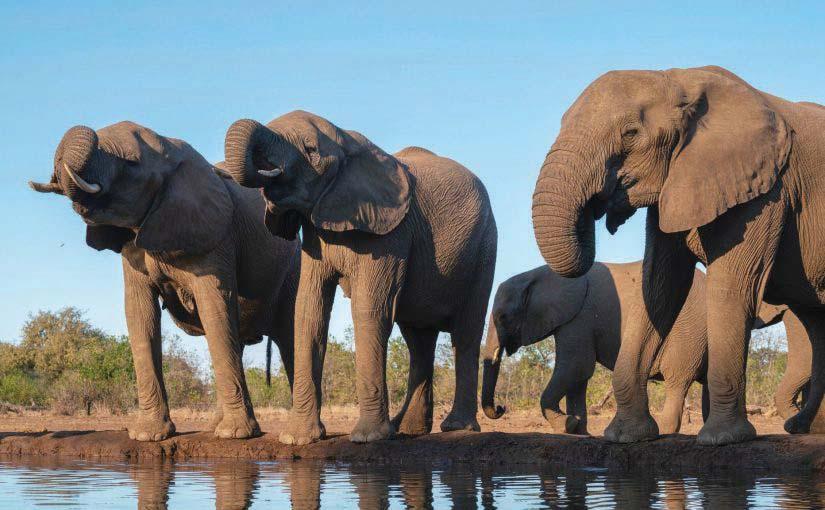
By Berninah Bogaisang
One of the tribal leaders in the North West district, has decried the late response to reports on human wildlife conflict incidents made by communities to the Department of Wildlife and National Parks, a situation that has for many years been a concern to people living in areas with wild animals.
Kgosi Oateng Sethodi of Chanoga said this during a consultative meeting to kick start the implementation of the Na-
tional Elephant Management and Action Plan (NEMAP), this week in Maun.
Sethodi emphasised that for the department to improve on its turnaround time to reports and attend to cases, it has to have offices placed strategically across the country for better service delivery.
Sethodi said the late response by officials to damages caused by wild animals has been a challenge to farmers with animals that include lions, elephants and cheetahs among others being their worst
nightmare. This alone exacerbates the already simmering tension between farmers and the animals, nullifying the government’s continued efforts to promote co-existence. Botswana formally adopted its National Elephant Management Plan and Action Plan (2021–2026) in 2021
.The drafting is a bottom-up, multi-stakeholder and consultative process which includes participatory regional workshops in Botswana’s elephant range areas, and a countrywide workshop. The
The main role of the Elephant Handler & Wildlife Monitoring Manager is to provide specialist support and advice to the property in the ongoing monitoring and, if necessary, handling of the rewilding elephant herd, released in 2023.
These elephants are subject to ongoing monitoring and surveillance as part of the rewilding research permit, which includes daily remote monitoring of their movements, condition and behaviour of the collared animals.
• 10yrs + experience in elephant training, handling and monitoring.
• Extensive knowledge in reading and monitoring elephant behaviour and conducting associated research.
• Working knowledge of GIS and Earth Ranger system, to support the remote monitoring and reporting activities.
• Excellent networks with elephant research, conservation and veterinary services in Botswana.
• Ability to monitor, record and/or track and report on information or data.
• Technical or camp maintenance background.
• Health & safety and first aid training.
• Understanding of High & Low Voltage Solar systems.
• Computer literacy.
• Experience working in a remote environment.
• Ability to lead and manage people.
• Developmental approach to staff
• Good communication skills and proficiency in English.
• High energy level, flexible and responsive.
• Ecological awareness and concern.
Applications may be sent to Kemmonye Wright, Kemmonye.W@ABOPR.
Africa by 23 August 2024.
consultation process ran for the period 2018 to 2020.
“We have seen other government departments going all out by setting offices across villages for better timely service delivery to communities, so I believe if DWNP does the same, human/wildlife co-existence may be achieved,” Sethodi highlighted. He further emphasised that DWNP should close the gap which currently exist between the department and farmers urging the department to frequently check on farmers and conduct public awareness campaigns instead of only waiting to respond to reports.
Giving an overview, DWNP Deputy Director Matshelo Makondwe explained that NEMAP is based on a logical framework format which is set to achieve the targets set for managing Botswana’s elephants while ensuring communities that co-exist with the elephants derive sustainable benefits from such co-existence.
According to Makondwe NEMAP’ mission is to provide guidance on management of elephants in Botswana based on primary targets which include among them maintaining viable population of elephants in Botswana, contribution of elephants to community livelihoods through sustainable utilization and human wildlife conflict management.
“The plan also has six key components which have been identified, among them is Protection and law enforcement, human-elephant conflict management, Management of habitats and connectivity, Social and Economic framework, Conservation capacity as well as Coordination and collaboration,” Makondwe said.
By Staff Writer
In an endeavour to improve its local economy and give the city the much needed facelift, Francistown City Council (FCC) has availed over 180 commercial plots for public private partnership projects.
This was revealed on Monday by the city mayor Godisang Radisigo during the ground breaking ceremony for Francistown Sports Centre project: a public private partnership project worth P3.5 million, between the City of Francistown, Sunshine property Group and Inter sport. The facility will have a five aside football pitch, padel and pickle courts, action cricket and netball courts. Construction of the sports centre begins end of August and will be complete April next year.
“As a local authority we are urging the private sector to engage with us in business ventures such as this one. The council has close to 180 plots around the city which we can partner with investors on to
develop. This sporting facility is one successful PPP venture. We signed a 10-year land lease with Sunshine Property Group,” said Mayor Radisigo. “Another successful venture we have to show is the Mummies plot, on your way to Dumela industrial. A new shopping mall has been built and recreation facility also under construction. I am inviting and urging the business community to come on board and grow the economy of Francistown.”
Although negotiations and processes for the Francistown sporting Centre dragged for eight years, Radisigo promised to ensure negotiations future public private partnership projects are quicker.
“This sporting facility will be a major attraction in Francistown. The City of Francistown and the Sunshine Property group are in a PPP model. This model is now bearing fruit. As this facility will be useful to the community in body building and a good initiative for the health of our nation”, high-
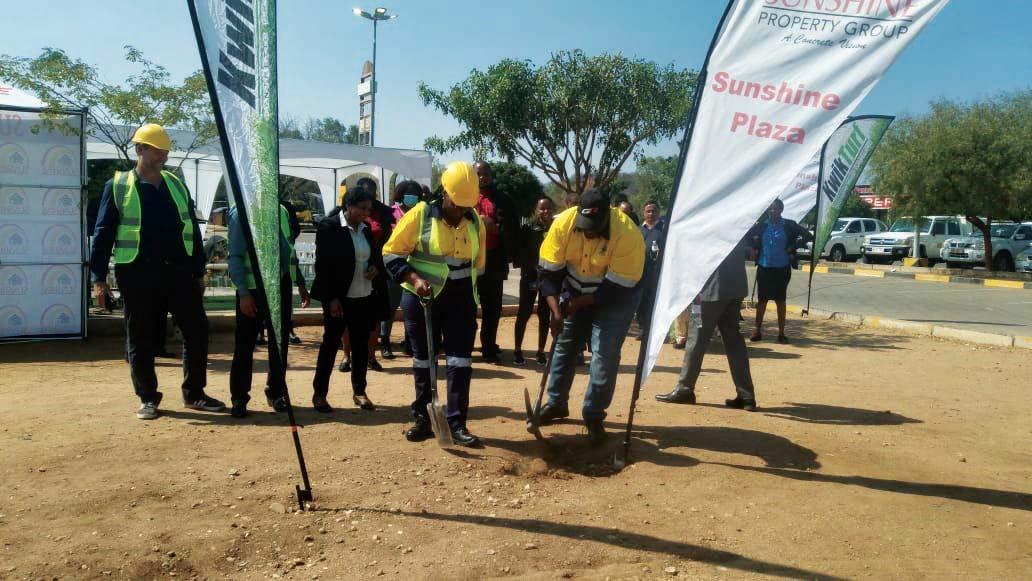
lighted Radisigo.
Sunshine Property Group Director Shyam Sreekaram indicated it was benefitting to be involved in the construc-
tion of the sporting centre, as the company’s roots began in Francistown before spreading its wings across the country.
“Sunshine Property Group is
one of the largest privately held property groups in Botswana with strong ties in Francistown going back 22 years ago. We have never waivered our continued investment into Francistown and we take our corporate social responsibility seriously”, said Shyam Sreekaram.
By Kgosietsile Bontsi
Government has been urged to address challenges of water, electricity and genetically modified seeds faced by the Pandamatenga farmers in order
to help improve production and ensure food security.
The plea was made by Pandamatenga Commercial Farmers Association Chairman Jaco Strachan during the official opening of the Chobe Agricul-
tural Show in Pandamatenga last week.
Strachan has assured government that should existing farms in Pandamatenga be connected to the Agro - Zambezi waterline, they expect an exponential
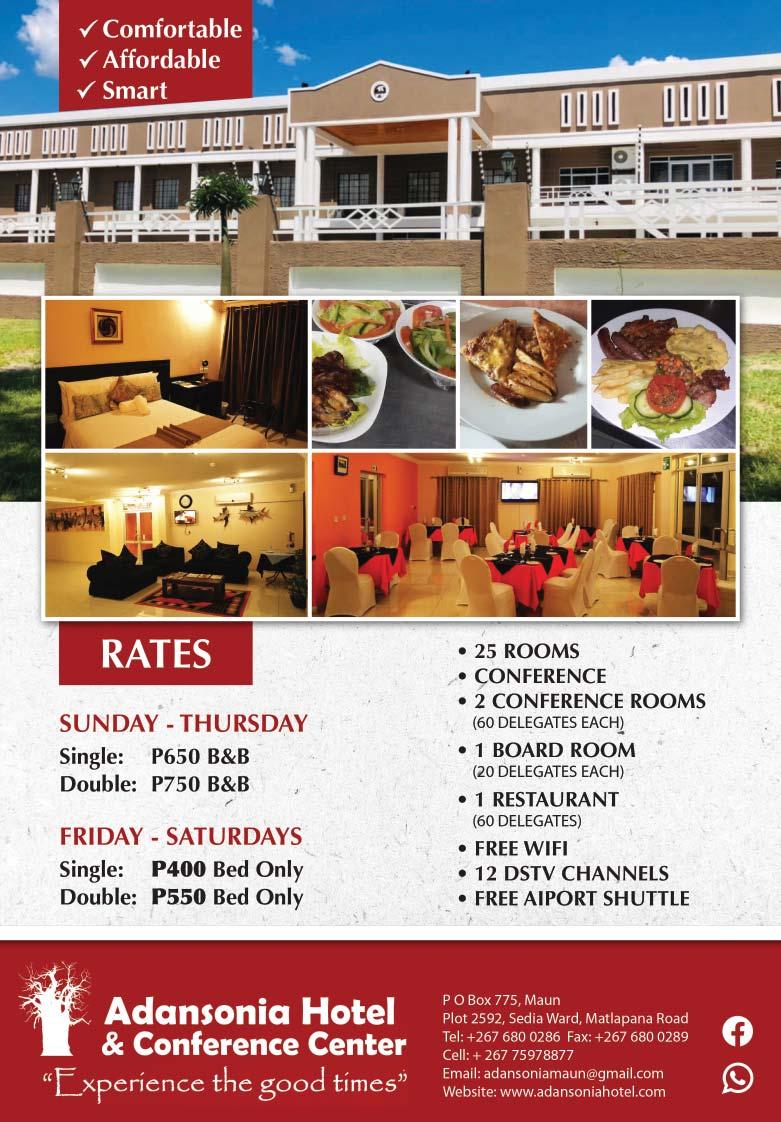
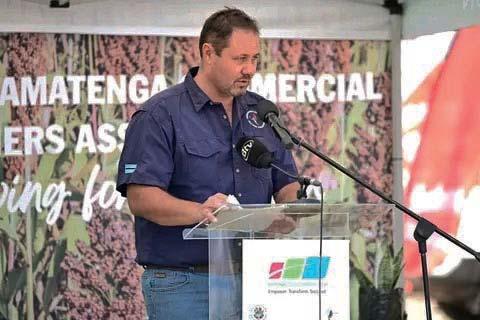
growth in production. He stated that not only will the silos fill to capacity, but the growth would open new markets never seen before in the region.
“Millions have been invested in irrigation systems and the results have been better than expected. Currently, we have about 1,000 ha of fields irrigated and used for growing potatoes, butternuts, tomatoes, and a second crop of wheat during winter time. Growing sorghum under irrigation has also been extremely successful,” he said.
On the issue of power, he requested for consideration on connecting farms to the national grid, alternatively help them build their own green power plant. This would allow farmers, to move away from diesel generators – thereby reducing both their carbon footprint, and production costs.
Regarding the GMO seeds, Strachan noted that they are
lagging behind the rest of the world in production and agricultural products, arguing that their maize cannot compete with the GMO maize from South Africa and other parts of the world. He stated that all the maize imported and consumed in Botswana is from South Africa, and mostly GMO. This as Botswana prohibits the use of GMO seeds.
“This has been an on-going discussion with the Ministry of Agriculture. Farmers need to improve their production levels, and this could be achieved using GMO seeds. We respectfully request that our government look into this quite urgently,’’ he said.
Strachan regretted that farmers throughout Botswana, have had a very tough season if not the worst droughts the country has experienced in more than 40 years.
He said because of the extreme
weather, commercial farmers managed to plant only 60% of their farms. Meanwhile President Mokgweetsi Masisi said unity and collaboration amongst farmers and other related actors is a necessary strategic action for dynamic, sustainable agricultural development and there is a need to stand up as networked socio-economic units to ensure food security and economic growth.
He said that this year’s show, being “Unity and Technology for Chobe, filling the Botswana Food basket,” is very relevant to the current Reset Agenda which calls for mind-set change in ensuring that the nation feed itself, create employment and feed others. According to Masisi, the theme underscores the need for all to go into a continuous technology improvement mode which will yield better crop results.

relationships.
Among adolescent girls who have been in a relationship, nearly a quarter (24%) – close to 19 million – will have experienced physical and/or sexual intimate partner violence by the time they turn 20 years old, as highlighted by a new analysis from the World Health Organization (WHO) published recently in The Lancet Child & Adolescent Health. Almost 1 in 6 (16%) experienced such violence in the past year. “Intimate partner violence is starting alarmingly early for millions of young women around the world,” said Dr Pascale Allotey, Director of WHO’s Sexual and Reproductive Health and Research Department. “Given that violence during these critical formative years can cause profound and lasting harms, it needs to be taken more seriously as a public health issue – with a focus on prevention and targeted support.”
Partner violence can have devastating impacts on young people’s health, educational achievement, future relationships, and lifelong prospects. From a health perspective, it heightens the likelihood of injuries, depression, anxiety dis-
orders, unplanned pregnancies, sexually transmitted infections, and many other physical and psychological conditions.
High rates of violence against adolescent girls reflect deeply entrenched inequalities
This study draws on existing data to provide, for the first time, a detailed analysis of the prevalence of physical and/or sexual partner violence experienced by 15–19-year-old girls who have been in intimate relationships. It also identifies broader social, economic and cultural factors that increase their risks.
While violence against adolescent girls occurs everywhere, the authors highlight significant differences in prevalence. Based on WHO’s estimates, the worst affected regions are Oceania (47%) and central sub-Saharan Africa (40%), for instance, while the lowest rates are in central Europe (10%) and central Asia (11%). Between countries, there is also a substantive range: from an estimated 6% adolescent girls subjected to such violence in the least affected countries, to 49% in those with the highest rates.
The new analysis found that intimate partner violence against adolescent girls is most common in lower-income countries and regions, in places where there are fewer girls in secondary school, and where girls have weaker legal property ownership and inheritance rights compared to men. Child marriage (before the age of 18 years) significantly escalates risks, since spousal age differences create power imbalances, economic dependency, and social isolation – all of which increase the likelihood of enduring abuse. Adolescent girls need targeted services and support
The study highlights the urgent need to strengthen support services and early prevention measures tailored for adolescents, alongside actions to advance women’s and girls’ agency and rights – from school-based programmes that educate both boys and girls on healthy relationships and violence prevention, to legal protections, and economic empowerment. Since many adolescents lack their own financial resources, they can face particular challenges in leaving abusive
“The study shows that to end gender-based violence, countries need to have policies and programmes in place that increase equality for women and girls,” said study author Dr Lynnmarie Sardinha, Technical Officer for Violence Against Women Data and Measurement at WHO.
“This means ensuring secondary education for all girls, securing gender-equal property rights and ending harmful practices such as child marriage, which are often underpinned by the same inequitable gender norms that perpetuate violence against women and girls.”
Currently, no country is on track to eliminate violence against women and girls by the 2030 Sustainable Development Goal target date. Ending child marriage – which affects 1 in 5 girls globally – and expanding girls’ access to secondary education will be critical factors for reducing partner violence against adolescent girls.
WHO supports countries to measure and address violence against women, including efforts to strengthen prevention and response within the health care sector. New WHO guidelines on prevention of child marriage are planned for release by the end of 2024. WHO.
Notice for the Environmental Impact Assessment (EIA) for the development of Sandibe Trails Camp in NG/31, Zone 2 by Southern Quest (PTY) LTD
In accordance with Section 7, subsection 2 (a) of the Environmental Assessment (EA) Act (Cap 65:07), a public notice is hereby given of the intent to undertake a public meeting as part of the Environmental Impact Assessment (EIA) for the proposed development of a six-bed satellite camp within management Zone 2 NG/31 by Southern Quest Pty Ltd. The new satellite camp will be supported by the existing Sandibe Camp to minimise the development infrastructure required.
Anticipated Benefits
• Economic benefits to local business and national economy
• Increased employment both during the development and operational phases
Anticipated Negative Impacts
• Disturbance and removal of vegetation at the development site
• Disturbance to wildlife
• Contamination of soil and/or water by fuels, oils, paints and varnishes
• Soil erosion and dust pollution on site and on the transit road
• Noise and visual pollution from construction processes and transport of materials and waste
The public and interested/affected parties are invited to attend a public meeting scheduled as follows: Venue DateTime Shorobe Village Kgotla28 August 202409:00 am
The purpose of this public meeting is to discuss the details of the proposed development and record any comments, questions, and/or information given by the public and register Interested and Affected Parties for consideration in the environmental studies. If you are unable to attend this meeting but would like to provide comments or feedback, please contact either the Dept. of Environmental Affairs Office at Mophane Av. Maun, or the Ecosystem Solutions for Africa office (ESA) at the Ngami Data Services Building, Mathiba 1st Rd, Maun for more information on the project. Alternatively, you can provide comments in writing before 31 August 2024 to: Ecosystem Solutions for Africa, PO Box 20361, Boseja, Maun or email: maun@esabotswana.com. Contact: Tel no.: 75366027.
Kitsiso ka tshekatsheko ya ditlamorago mo tikologong le matshelo a batho mabapi le go agiwa ga kampa ya Sandibe Trails Camp mo NG/31 Zone 2 ke ba kompone ya Southern Quest (Pty) Ltd
Go diragatsa tsetlana ya bosupa, temana bobedi ya molao wa tsheka tsheko tikologo wa Cap. 65:07, sechaba se itsisiwe ka maikaelelo a go tshwara phuthego mabapi le tshekatsheko ya ditlamorago mo tikologong le matshelo a batho tsa tiro ya go aga sesha kampa ya Sandibe mo NG/31 ke ba kompone ya Southern Quest. Kampa e etlabo e tshegeditswe ke madirelo a setseng ale mo tirisong. Ditlamorago tse dintle tse di solofetsweng
• Go godisa madirelo le itsholelo yamo gae
• Go tlhamiwa ga mebereko ka nako ya go aga le fa kampa e le mo tirisong
Ditlamorago tse di sa nnang sentle
• Go gotlhega ga tikologo mo go ka bakwang ke go kgaolwa ga ditlhare
• Go kgoreletsa diphologolo tsa naga
• Kgotlelesego ya mmu e bakwang ke go tshologa ga mafura
• Kgotlhego ya mmu le lerole le le feteletseng mo ditseleng tsa tiriso go ya kampeng
• Modumo yo o feteletseng yo bakwang ke dikoloi le di dirisiwa ka nako ya kago
Sechaba bana le seabe le botlhe ba ba amegang ka tiro e ba lalediwa phuthego kwa lefelong le le latelang, ka nako e e beilweng fa tlase: LefeloLetsatsiNako
Kgotla yaShorobe 28 Phatwe202409:00 am Fa o sa kgone go tsenelela phuthego e, o ka itshwaraganya le ba ofisi ya lephata la Merero ya Tikologo kwa Mophane Ave, mo Maun kana ba Ecosystem Solutions for Africa (ESA) kwa ofising ya Ngami Data Services mo tseleng ya Mathiba 1stRD, Maun. Tsela e nngwe e o ka tsayang karolo ka yone ke go kwala dikakgelo tsa gago pele ga 31 Phatwe 2024, wa di isa kwa ofising ya Ecosystem Solutions for Africa, P O Box 20361, Boseja, Maun kana maun@esabotswana.com O ka re tshwara mo mogaleng o latelang: 75366027

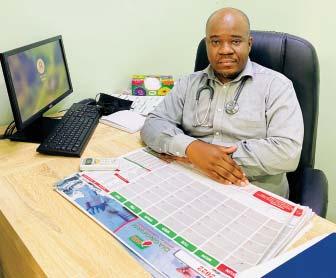
* With Dr Bernard Morapedi
This week’s health column will be a follow up on the topic of “diarrhoea in children”, which we published last week. I thought to discuss the topic of cholera, which can cause diarrhoea in both children and adults. This condition is often responsible for outbreaks of diarrhoea and is associated with high death rates.
Cholera is an acute diarrheal illness caused by infection of the intestine with Vibrio cholerae bacteria. People can get sick when they swallow food or water contaminated with cholera bacteria. The infection is often mild or without symptoms, but can sometimes be severe and life-threatening.
The risk of cholera transmission multiplies when people live in poor or overcrowded conditions and lack access to safe water, proper sanitation, and hygiene facilities. Other people more at risk of getting cholera are health care personnel attending to cholera patients, emergency response teams and travellers. A person can get cholera by drinking water or eating food contaminated with the cholera bacterium. Large epidemics are often related to faecal contamination of water supplies or street vended foods. The disease is occasionally spread through eating raw or undercooked shellfish that are naturally contaminated.
The hallmark of cholera is profuse watery diarrhoea, which forms stools that are often described as “rice water stools” because the colour and consistency often resembles that of water that has been used to cook or wash rice. The patients often have uncontrolled and frequent bowel movements. The severe diarrhoea can often lead to significant fluid loss and eventually result in dehydration, shock, renal failure and eventually death if left untreated. Other symptoms which may accompany diarrhoea include vomiting,
thirst, general body malaise, abdominal cramps and restlessness.
The definitive diagnosis of cholera is made by microscopic examination of the stools and some special staining tests. When there is an outbreak of cholera treatment is often initiated based on clinical suspicion and confirmation is not necessary. The mainstay of treatment in those with a suspicion of the disease is fluid replenishment.
Oral rehydration solution which can be in the pre-packaged form made at home with salt and sugar is used as the initial therapy. Up to 100ml of fluid every five minutes until the patient stabilises is required. Large volumes of fluid are required in the first 4 hours, up to 5l in an average 70 kg man. Patients who have uncontrollable vomiting, who are unable to drink , in a coma or with severe dehydration should be urgently referred to a health care facility for intravenous fluids. Oral antibiotics are also administered in those with severe dehydration.
To prevent further spread when caring for people with cholera it is important that the stools are disposed in a safe manner. They must be meticulous hand washing to prevent spread. Clean drinking water is also needed. It is important for people with symptoms suggestive of cholera to seek help immediately. The death rate can be high, with 1 in 4 to up to half of patients with severe disease dying.
Specialist Physician
MBChB (UP), Dip HIV MAN (SA), MMED (Internal Medicine), FCP (SA).
Based at Doctors INN health center and Maun Private Hospital. drbernard.morapedi@ gmail.com 75170521
NOTICE TO ADVERTISERS
All employment advertise worldwide distribution, FREE OF CHARGE. Per-
sonal notices for Births, Deaths, Engagements and Marriages are carried free of charge.
PUBLIC NOTICE
I Keikanne Ndobano own-
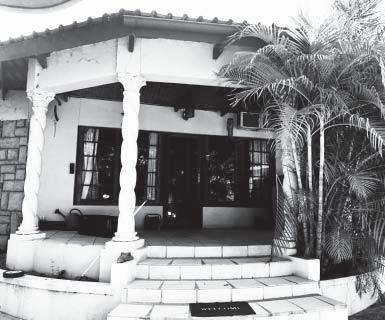
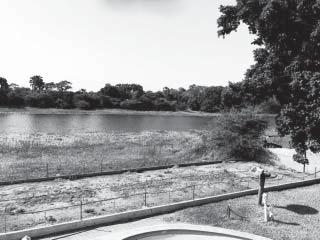
This property is also suitable for a restaurant or guest house. Three bedrooms in the main house and two more at the garage. Two lounges the one upstairs can accommodate up to 40 people. Borehole, swimming pool walled with sliding gate. Outside building with two rooms.
Registered in the name of a non-trading company whereby ownership will change by the transfer of shares.
Enquiries to ecowild@ngami.net
Asking price P3.5m negotiable
ENVIRONMENTAL IMPACT ASSESSMENT FOR THE DEVELOPMENT OF LODGE IN NG12 BY UNCHARTED AFRICA SAFARI CO. (PTY) LTD
In fulfilment of Section 7, Subsection 2 of the Environmental Assessment Act (Cap 65:07), notice is hereby given for the intent to undertake an Environmental Impact Assessment in respect to Uncharted Africa Safari Co. (Pty) Ltd undertaking construction of a tented lodge in NG12. The proposed development will entail construction of twelve guest accommodation units, staff residence, canteen and recreational area, office building, main mess tents on deck with pool, kitchen and back of house, curio shop, spa, borehole, solar array, fuel point and workshop or service area, sewage treatment plant and auxiliary infrastructure including water, sewer and walkways.
The anticipated impacts of the project include:
Positive Impacts:
• Employment opportunities
• Generation of revenue through tax returns
• Availability of accommodation in NG12
• Tourism value chain access (supplies of vegetables, meats, transport services etc.)
• Arts & Crafts development – broader opportunities for cultural tourism linkages
• Higher community benefit from community projects funded through the direct linkage of revenue to funds set aside for community initiatives
Negative Impacts:
• Noise pollution (during construction)
• Dust pollution (during construction)
• Waste pollution (during construction)
• Vegetation loss
• Possibility of fatalities and injuries caused by wild animals
er of plot 297 located in Ikoga, i intend to do change of land use from single residential to civic and community development. Whoever has an objection regarding the proposal should forward it to, Physical Planning Office at telephone no.6870372, Okavango District Council or in writing within (14) days of publication of this notice (1179) Notice to neighbours of Simon Mavolontia at
Matlapana ward in Maun, Ngami-land region, the plot is accesable by a gravel road from the main road, From Matlapana circle you drive 800 meters north then turn right and drive 900 meters to reach to the plot. The owner of the aforesaid plot wishes to change land use from a single family residential plot to a self catering plot. Neighbours may contact Maun Administrative Authority, Phys-
ESHMN-000005/21
IN THE ESTATE of the late Keith K. Diako who died at Letsholathebe II Memorial Hospital, Maun,Ngamiland District, in the Republic of Botswana on the 29th day of June 2021.
NOTICE IS HEREBY GIVEN that Debtors and Creditors in the above Estate are hereby required to pay debts and file claims of whatever nature with the undersigned within 30 days after publication hereof.
Kethoahetse Henderson Digwa, Executor, Cell No.72207808
P O Box 20727, Maun
Kebadiretse Diako, Executor, Cell no. 712204000
P O Box 630, Maun
KITSISO MO SECHABENG
ical Planning Office at 6861844 if they disapprove this change within 21 days (1179)
EMPLOYMENT
Two (2) herdman required at Machaba cattle post should be able to work and be prepared to spend extended periods in remote area. Contact Mr Omogae S. Ntsie on 71639676 (1179) Dumonzana Farm is looking for two male farm workers with certificate in Agronomy or Agriculture with more than five years experience as farm supervisor or farm assistant. Preference will be given to someone with more than five years experience with certificates or without certificates, knowledge in farm management and farming skilss sets, trustworthy with traceable references, email: dumonzana@gmail.com. For more information contact 72488177/whatsapp no. 71519096 (1179) Farm worker wanted at Maila-Semboyo apply to Boitshwaro Moitupedi. P.O. box 1479 Francistown. Cell 72731917 (1179) FOR SALE
Business plot 5737 situated at Boyei, Gumare for sale. Please contact Botho Gaebolae on 72553031 (1179) Residential plot for sale of lot 431, situated at Gumare village. Contact Kethotswang Ditshwaane on 72470503 (1179)
TSHEKATSHEKO YA SEEMO SA TIKOLOGO MABAPI LE KAGO YA LODGE KWA LEFELONG LA NG12 KE BA UNCHARTED AFRICA SAFARI CO. (PTY) LTD
Ka maikaelelo a go netefatsa molawana wa Tshekatsheko ya Tikologo (Cap 65:07), Karolo ya bosupa (7), Karolwana ya bobedi (2), kitsiso e, e ntshiwa ka maikaelelo a go dira Tshekatsheko ya Tikologo mabapi le kago ya lodge kwa lefelong la NG12. Ditlhabololo tse di tla dirwang di akaretsa matlo a boroko a le lesome le bobedi a boroko a baeng, matlo a babereki a na le lefelo la bojelo le la itloso bodutu, diofisi, lefelo la bojelo le le fa godimo le na le lefelo le go thumelwang mo go lone, lefelo la boapeelo, lebentlele, lefelo la tshidilo, sediba, lefelo le go tsewang marang a letsatsi, lefelo le go tshelwang lookwane teng le fa go baakanngwang dikoloi teng, lefelo le go tlhatswiwang metsi a a leswe, mafaratlhatlha a metsi, metsi a a leswe le fa go tsamaiwang teng.
Ditlamorago tsa tiro e e ka nna tse di latelang:
Ditlamorago tse di molemo:
• Tlhamo ya ditiro
• Go direla lefatshe madi ka go duelwa ga makgetho
• Go nna teng ga matlo a boroko kwa lefelong la NG12
• Go atamela ga ditlamelo mo lefelong la bojanala (thekiso ya merogo, dinama, dipagamo jalo jalo)
• Go tlhabologa ga botaki le bodiragatsi. Ditshono tsa go supa bojanala jwa ngwao di a ntsifala
• Setšhaba se nna le ditlhabololo tse di tlang ka ntlha ya madi a a seegelwang fa tlhoko mo letsenong go thusa morafe
Ditlamorago tse di bosula:
• Koketsego ya modumo
• Koketsego ya dithole
• Kgotlhelo tikologo ya matlakala
• Go kgaolwa ga ditlhare
• Kgonagalo ya go bolawa kana go gobatswa ke diphologolo tsa naga
The purpose of this notice is to invite the general public, interested and affected parties and relevant stakeholders to attend a consultation meeting to contribute their views and concerns with regards to the proposed developments. The meeting schedule is as shown below:
VenueDateTime
Eretsha Village Kgotla26th August 202409:00 hours
Any comments and queries regarding the implementation of the project should be addressed to the following:
Ecocode Consultancy (Pty) Ltd
P.O. Box 100075, Maun, Botswana
Cell: +267 77916981
Email: grainvile@gmail.com
Uncharted Africa Safari Co. (Pty) Ltd
P O Box 173, Francistown
Cell: +267 72895820
Email: eugene@unchartedafrica.com
Mosola wa kitsiso e ke go tlhagisa baagisanyi le botlhe ba ba amegang ka tiro e e tla dirwang le go tsaya megopolo ya morafe mabapi le ditlhabololo tse. Morafe o lalediwa go tla phuthegong ka letsatsi le ka nako e e latelang:
LefeloLetsatsiNako
Kgotla ya Motse wa Eretsha26 Phatwe 202409:00 mo mosong
Dikakgelo le dipotso mabapi le tiro e, di ka romelwa kwa atereseng tse di fa tlase:
Ecocode Consultancy (Pty) Ltd
P.O. Box 100075, Maun, Botswana
Cell: +267 77916981
Email: grainvile@gmail.com
Uncharted Africa Safari Co. (Pty) Ltd
P O Box 173, Francistown
Cell: +267 72895820
Email: eugene@unchartedafrica.com
By Kgosietsile Bontsi
Botswana Tennis Association (BTA) has sent a team of six tennis players to compete at the International Tennis Federation Confederation of Africa Tennis Southern African Teams Competitions, which started on Tuesday in Maputo, Mozambique and ends tomorrow (Saturday).
The competition serves as a qualifier for the 12 and Under African Junior Championships (AJC) Team competitions that will be hosted later this year. Teams from the Southern African regions will compete for the top two slots in the boys’ and girls’ categories to qualify for the AJC.
The team is made up of Camilla Seetso, Malak Macheng and Angel Chakanyuka who will be participating under the girls’ category while Moshe Lekaukau, Rorisang Macheng and Lebone Tlape will compete under
the boys’ category. Botswana is in Group B and will compete against Zimbabwe, Mozambique and Malawi to secure a spot in the next stage.
In an interview, BTA Public Relations and Marketing Director Tshephang Tlhankane said their preparations for the tournament started a month ago, hence the team was in good spirit and super excited to be part of the tournament. He noted that the team worked with a high performing coach during and after the selection camp right through to departure.
‘‘The plan is to get the players to play the best tennis they can, once players enjoy the matches and follow the coach’s instructions, the ultimate goal gets achieved,’’ he said.
Meanwhile, BTA issued a press release on the 5th August 2024 announcing that the BTA Vice President Technical Nonofo Othusitse and Vice President Admin Atang Mokgware have been
appointed by the Confederation of African Tennis (CAT) as Members of the CAT Davis Cup and Billie Jean King Cup Africa Commission and CAT Administrative and Finance Commission respectively. The appointments are for the year 2024 and 2025.
According to BTA, the CAT Davis and Billie Jean King Cup Africa commission is charged with evaluating the participation of African teams in the competitions, studying the possibilities of increasing the number of countries participating and encouraging countries to host these competitions. It further states that the role of the CAT Administrative and Finance Commission is on the responsibility matters around funds and budgets ensuring efficiencies, effectiveness and governance for CAT as an organization that will help the organization to reach its objectives as outlined in its future development plan.
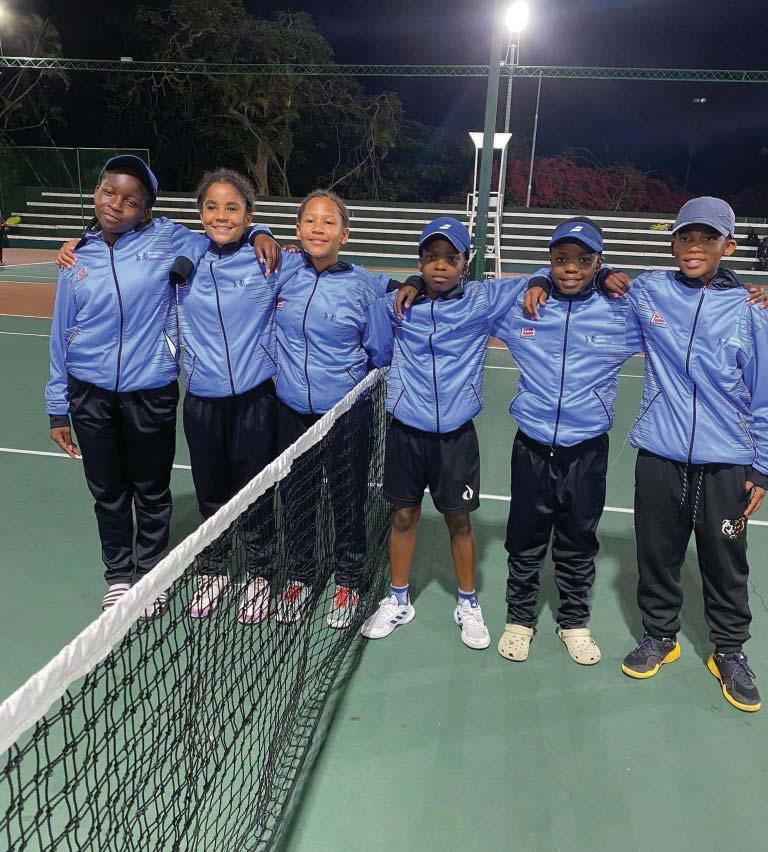
By Kgosietsiele Bontsi
The Chobe Regional Football Association (CHORFA) under-23 team has been crowned champions of the Northern Block tournament that was held in Letlhakane on the 3rd August 2024 at Diamond Chiefs Stadium.
The first ever tournament that
was organised by Boteti Regional Football in partnership with Lucara Botswana had brought together the under-23 teams from northern regions including Francistown, Boteti, Chobe and Nhabe. The Chobe under- 23 won its first game 2-0 against Francistown region while Nhabe won its first game 1-0 against
Boteti. Thus Chobe advanced to the winners’ finals match where they walloped Nhabe region 4-2 in the penalties following a 1-1 draw. In the losers finals Boteti defeated Francistown 1-0.
In an interview, CHORFA Chairman Tshegofatso Balisi said the main objective of the tournament was to give under
From page 11
part of the league, where the Delta Spirits emerged victorious with a commanding 95 to 34 win. However, the official game later in the day saw Orapa taking a dominant stance, attacking the paint and drawing fouls early, which led to a challenging first half for the Delta Spirits as they conceded multiple free throws. In the second half, the Delta Spirits attempted a comeback, forcing multiple turnovers from the Orapa team but struggling to convert. The home crowd’s energy in the fourth quarter fueled the Delta Spirits, who played with renewed vigor. Despite their efforts to cut down the deficit, the damage was already done, and Orapa emerged victorious
with a final score of 72 to 64. Ratanang shared his thoughts on the game, saying, “I think we have things to work on and will prepare better for the next game we have coming next week against Orapa again. This time, I think we will come out stronger than we were today. All we can take is how we finished the game, and that kind of determination is what we will bring to the next game.”
On the other side, Obakeng Maebolwa, the captain of the Orapa Basketball team, expressed his pride in the victory, stating, “This was a tough matchup, but I am proud that we took this game. I am looking forward to the next game.”
With the next game against Orapa on the horizon, the
Delta Spirits have a chance for redemption. The team will undoubtedly be focusing on their weaknesses and strategising to ensure a stronger performance. The rematch promises to be another exciting encounter as both teams vie for supremacy in the league. The crowd’s support will be crucial, and the Delta Spirits will need to harness that energy from the start to avoid repeating past mistakes. As the league progresses, fans can look forward to more thrilling basketball action, with each game contributing to the teams’ growth and the sport’s popularity in Botswana. Both teams have shown resilience and determination, setting the stage for a highly anticipated next round.
23 players in Northern Block exposure and to give Botswana Football League (BFL) team an opportunity to identify players who play in areas which they were not able to reach during the season.
Balisi has revealed that the tournament had no sponsor but the donations and gate takings were used for administration of the tournament.
He noted that the tournament will be played annually and the aim is to identify sponsors so that they can compete with other regional blocks at national level in the future.
“This was the first of its kind and we are the first block to host such games and our wish is to see it in all BFA blocks,’’ he said.
Chobe under-23 team Coach Bakanuki Maseko has Told Times Sport that their team was had some players from the Division One League teams, adding they have not had enough time to prepare for the tournament because they were invited at the last minute.
He was of the view that the last minute invitation was as a result of miscommunication by the organisers. He said that this affected their preparations as they had to recruit and transport their players
from faraway places amidst financial difficulties. Maseko has stressed that his team did not have much time to train together.
‘‘The competition was not that tough because most participating teams did not have much time to prepare and the criteria they used to recruit players was very poor as they left behind those participating at the regional league,” he said.

Change of use, Subdivisions, Land Matters and Development Consultants:
Location: Plot number 20570, Boseja Industrial, P O Box 300067, Maun, Contact number:Mr. Lebadi@76509303
Neighbors of a plot belonging to Production Paper (Pty) Limited located in Thito ward, legally referred to as tribal lot 16723, Maun wishes to change the use of the plot from commercial (Office Blocks) to Civic and Community (College).
Neighbors of a plot belonging to Elizabeth Ogomoditse Wale located in Shashe ward, wishes to change the use of the plot from single family residential (SFR) to Multi Family residential (MFR).
Neighbors of a plot belonging to Gaotingwe Tsatsilebe located in Sedie, legally referred to as tribal lot 24117, Maun wishes to change the use of the plot from single family residential (SFR) to multi family residential (MFR).
Neighbors of a plot belonging to Hakgamalang Ramooketsi located in Disana ward, legally referred to as tribal lot 22055, Maun wishes to change the use of the plot from single family residential (SFR) to multi family residential (MFR).
Neighbors of two plots belonging to Mokonda Moses located in Botshabelo ward, legally referred to as tribal lot 11974 Maun wishes to change the use of the two plot from single family residential (SFR) to commercial (Self Catering Apartments).
Owners of the aforesaid neighbouring plots are thus consulted for approval or non approval of this notice.
Neighbours may contact North West District Council or Okavango District Council, Physical Planning Office at telephone no: 6861844 /6874040 if they dissaprove of this change of use within 21 days.



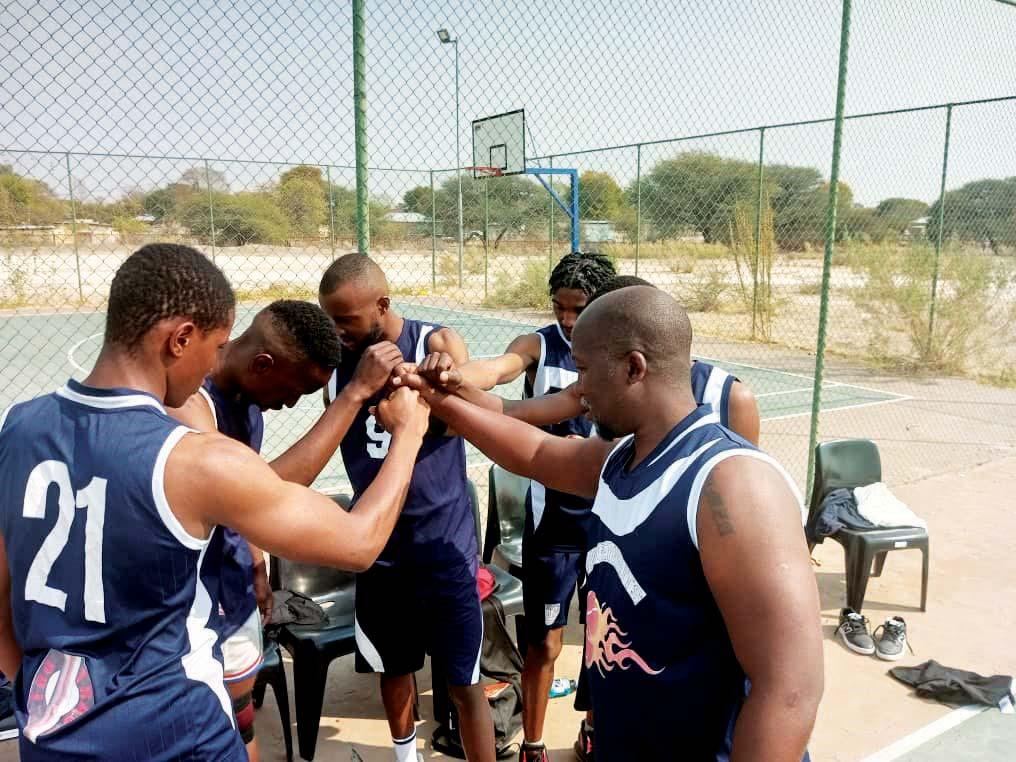
a
and

flected on the games stating, “Unfortunately, the outcome is not what we wanted. I think we started slow, let the game get out of hand, and did not
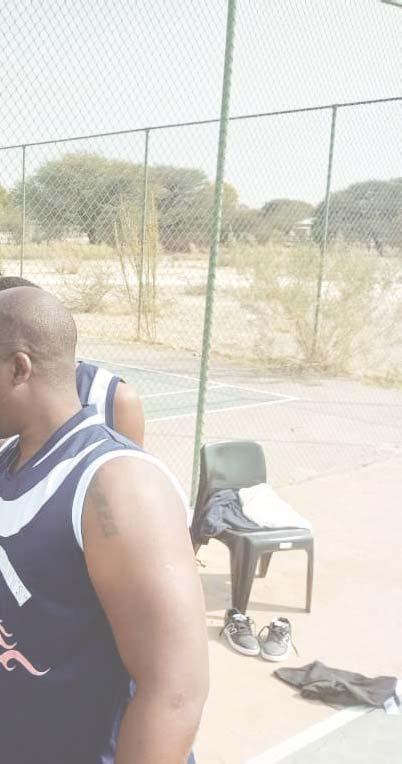
adapt adequately and in time. We lost the game because we let them get into our heads.”
after a winter hiatus, with the tournament initially set to feature the BIUST basketball team. However, BIUST did not make it to the games,
leaving Delta Spirits and Orapa the only competitors. In the morning, the two


